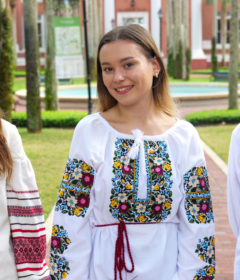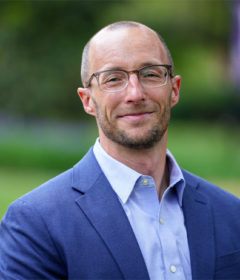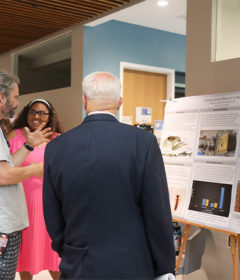Preserving Ancient Pottery in Italy
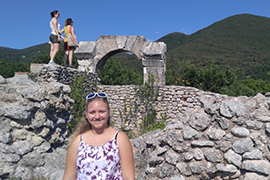
Stetson University senior Kayla MacPhee wants to attend graduate school and become an art conservator, specializing in ancient ceramics, but getting hands-on experience in the United States can be difficult.

MacPhee traveled this summer to San Gemini, Italy, and is working with Roman ceramics more than 2,000 years old – a prized experience for an art history major who hopes to attend one of just six graduate programs in conservation in the United States.
“This experience is so unique because I am actually working with pieces of pottery and learning ways of conservation,” wrote MacPhee in an email while interning for four weeks with the San Gemini Preservation Studies program. “There is no chance of doing that in the United States until you have already been accepted into a conservation program.
“Being able to attend SGPS will give me a better chance of getting into a graduate program and also help me figure out what kind of conservationist I want to be. I was leaning towards object conservation and after this experience so far I still believe that’s the right direction for me,” she wrote.
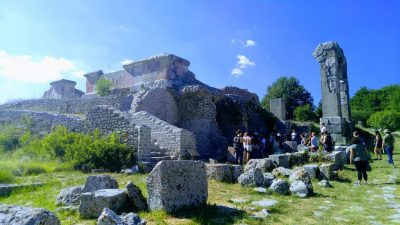
Stetson encourages students to find internships during their undergraduate studies, even if one isn’t required to graduate in their major, said Amy Barber, Internship coordinator with Stetson’s Career & Professional Development office.
Currently, internships are required for students majoring in communications, public management, and aquatic and marine biology, and those minoring in journalism. Starting this fall, the School of Business Administration will require entering students to complete an experiential learning component, which includes options such as internships, study abroad, guided research and others.
During the 2016-2017 academic year, 176 students received academic credit for completing an internship, Barber said. But many more students find summer work in their field of study, even if they don’t receive academic credit, she said.
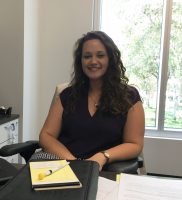
For example, Stetson surveys graduates and 58 percent reported they had completed an internship while working on their Stetson degree, according to the 2016 survey, the most recent year that data is available. Of those, 46 percent completed one internship, 30 percent completed two, and 15 percent completed three.
Internships are the “ultimate return on investment for today’s college student,” helping students land jobs after graduation, wrote Forbes magazine last year.
Most importantly, Barber tells students that an internship during their undergraduate education lets them try out their field of study and make sure they enjoy it, before investing years of work to earn a bachelor’s degree and possibly advanced degrees.
“I would say the biggest reason that I tell students to do internships is that it is a chance for them to test out a field,” said Stetson’s Barber.
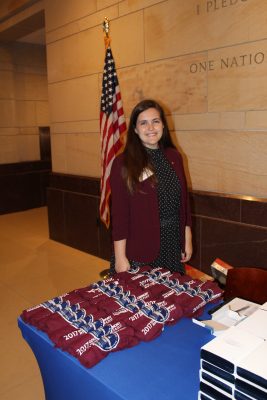
This summer, Stetson students are interning at the Museum of Arts and Sciences in Daytona Beach, the Marine Discovery Center in Ponce Inlet, for Facebook and Microsoft on the West Coast, and on archeological digs in Italy and England.
Many internships, such as ones with Facebook and Microsoft, are paid. Others with nonprofit groups or in the arts usually are unpaid. Stetson offers two travel awards to help defray costs, with awards ranging from a few hundred dollars to $2,500, Barber said.
Lauren Spratt is spending her summer in Washington, D.C., an invaluable experience for a political science major who hopes to work one day in the nation’s capital. Spratt interns for Congressional Award, a non-partisan charity run through Congress, and she gets to wander the halls and underground tunnels of the Capitol, helping, among other things, to organize the Gold Medal Ceremony for youth who receive a Congressional Award.
It’s an exciting summer to be in D.C., she added, with some interns getting a chance to attend the Congressional hearings that have dominated the news, including the Senate Intelligence Committee investigating Russia’s alleged interference in the 2016 presidential election.
“I had no idea what to expect from an internship,” said Spratt, who will start her junior year next month at Stetson and hopes to work in the nation’s capital after graduation for a foundation or nonprofit where she can impact legislation. “I think I’ve learned a lot more than I thought I would. … My advice would be to take advantage of every experience. It’s valuable work experience to interact in a professional setting.”
-Cory Lancaster
Send us a Photo
Are you interning this summer?
Send us a photo at [email protected] and we’ll share it on Stetson social media.

